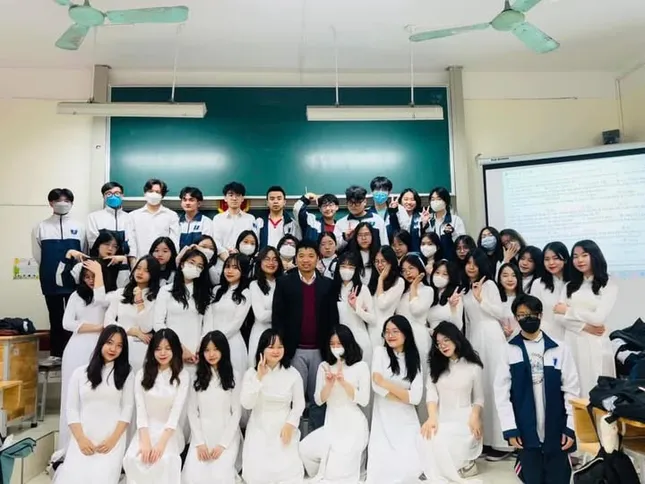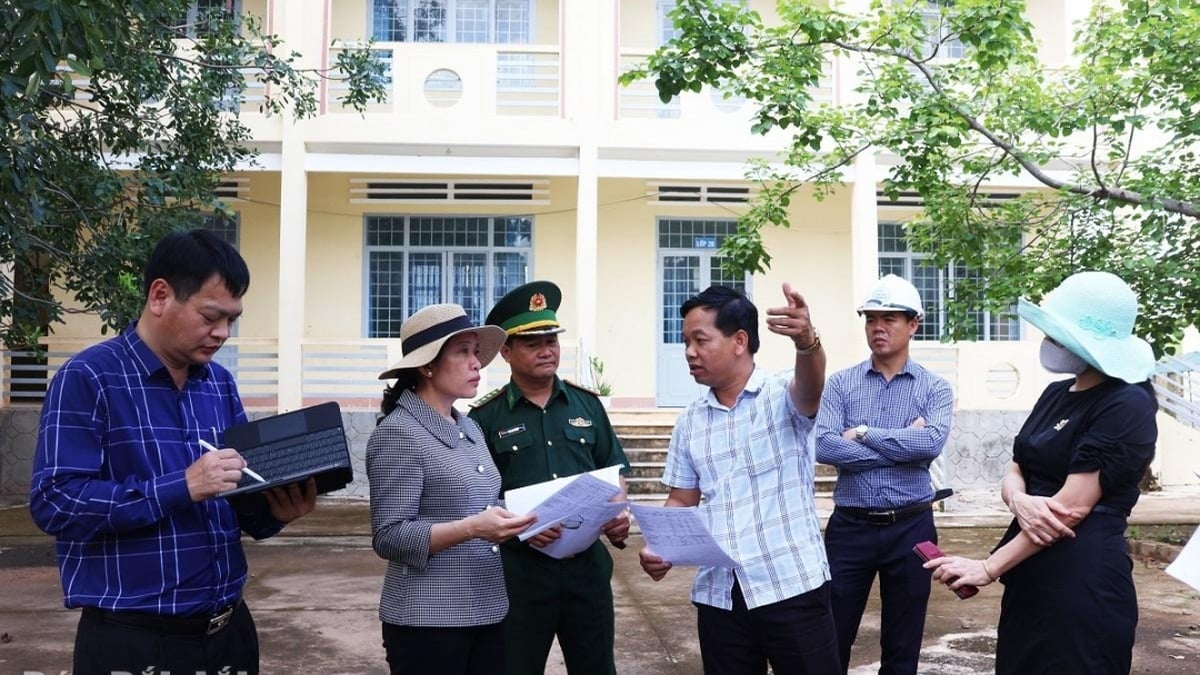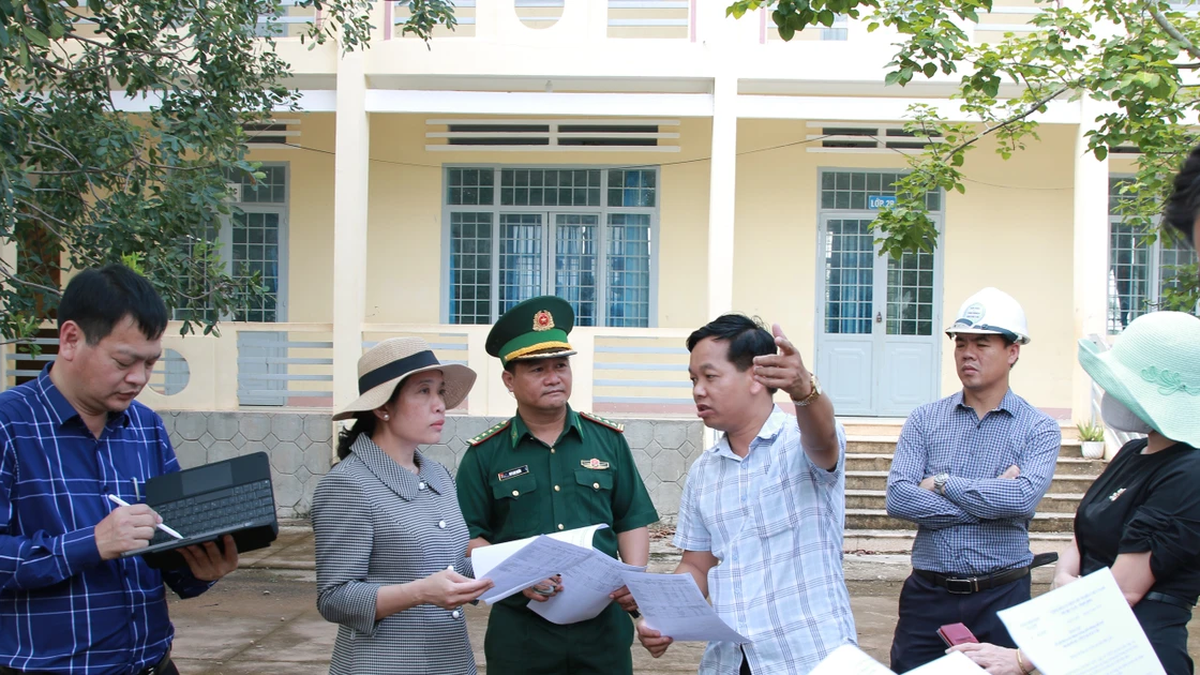 |
Teacher Ngo Xuan Quynh, teacher at Phan Dinh Phung High School ( Hanoi ) (standing in the middle) with his students. Photo: NVCC |
The year 2025 marks a special milestone in the high school graduation exam: for the first time, Chemistry is included in the assessment according to the new General Education Program (GDPT 2018).
This change comes not only from the content of knowledge, but also from the structure of the exam and the scoring method – all of which require candidates to have systematic thinking, flexible processing skills and attention to every small detail.
Teacher Ngo Xuan Quynh, a teacher at Phan Dinh Phung High School (Hanoi) shares how to review lessons during this time.
Remembering by Mistakes – Using a Personal “Error Notebook”
Teacher Ngo Xuan Quynh believes that in the last week before the exam, there is not enough time to learn a lot of new knowledge. When the mind is clear, we learn less but deeply and that is the time to start a smart learning strategy by creating a "mistake notebook". This is the golden time to correct old mistakes - mistakes that if not noticed, students can repeat right in the exam room.
I advise you to keep a small notebook, called “Error Notebook” – where you can record all the questions you have done wrong during your practice or review process. Every time you make a mistake, don’t just cross out the correct answer and ignore it. Do:
Clearly write down the question, the wrong answer you chose, the correct answer, and most importantly, the reason for the mistake: wrong formula, confused concept, not reading the unit carefully, hastily deducing without a step...
If it is a type of question that may be repeated (e.g. electrolysis, esters, corrosion, transformation series...), write down the correct way to do it and give a quick solution.
The “error notebook” is like a map of each student’s own danger zone. Looking at it, they know where they are likely to stumble and what they are likely to make mistakes about. Every night before going to bed, just reading through that small notebook is equivalent to several hours of scattered, aimless studying.
You don’t need to write down hundreds of mistakes, just 30–50 of your most common mistakes, but understand them well and never repeat them – you will significantly increase your chances of getting a high score. Because in multiple choice tests, the ability to “not make mistakes” is just as important as the ability to “do it right”.
In a real exam, sometimes a 0.25 point question is lost just because of wrong units, wrong answers, forgetting to balance equations, missing words, or confusing substance names. These mistakes are often not about knowledge, but about subjectivity and unconscious repetition. The “Error Notebook” is a mirror to help you recognize, correct, and overcome yourself.
Remember that the test does not fail you because of difficult questions, but because of silly mistakes that you have made.
Systematize knowledge by topic – Study less but hit the mark
With not much time left, studying too much will overload students. Instead of studying each chapter of the textbook, students should divide knowledge into a system of key topics.
For example:
General - Inorganic: Electron configuration of d-group elements, transition metal elements, reaction rates, factors affecting reaction rates, oxidation-reduction reactions, chemical energy, electrolysis, metal corrosion, acidity, base, amphoteric properties of ions and molecules and chemical questions about life related to N, S such as eutrophication, fertilizers, acid rain. Exercises related to titration, pH and especially paying attention to the correlation between parts and the problem of converting units between different amounts of substances, etc.
Organic chemistry: review concepts, physical properties, chemical properties of hydrocarbons, alcohols, ketones, aldehydes, carboxylic acids, etc., esters, fats, carbohydrates, amines, polymers. Number of products substituted into mono alkane X (X is a halogen). Percentage of halogen substitution into H of C levels I, II, III. Comparison of acidity, boiling point of organic substances. Rules for substitution into aromatic rings.
Instead of skimming through the entire chapter, you should focus on practicing by group of exercises, and do from basic examples to high-level questions in each type. This system should be combined with practicing exercises by topic, ensuring both theoretical review and practical problem-solving skills.
When you finish each topic, mark the parts you are not sure about, add your mistakes to your "Error Notebook", and practice again the next day to make sure you don't forget.
And remember: this year’s exam will not only be a test of knowledge, but also an assessment of accuracy and test-taking skills. A small mistake, a wrong step in calculation or an incorrect answer – all can cause you to lose points. With the scoring method for each independent question, there will be no room for carelessness.
Don’t forget to spend time practicing – not to get a score, but to analyze and learn from your mistakes. Each wrong question is an opportunity to review the knowledge, understand the nature and avoid repeating the same mistakes in the exam room.
Change your circadian rhythm – train your brain to stay alert during the actual exam
It must be affirmed: this is not the time to cram. Nor is it the time to follow the tricks or the “lucky” type of questions. This is the time to systematize and solidify the existing foundation, down to the skills of analyzing multiple choice questions.
There is only one short week left until the exam. This is no time to "scramble" knowledge, no time to "crawl" all night in despair.
If over the past few months, many of you have been used to studying late at night, staying up until 1-2am and then sleeping in the next morning, then stop today. Adjust your biological rhythm. Go to bed before 11pm, wake up at a time close to the exam time (6:30-7:30am), and get used to operating your mind at its peak between 7:30-10:30am – the time when you take the real exam.
Because if you continue to stay up late, your brain will be tired, your ability to concentrate will decrease, your reflexes will slow down, and even on the day of the exam, when the whole room is busy thinking, you will be... sleepy. The investment of months will be exchanged for a "brain freeze" just because your biological clock is out of phase.
Stop studying late and instead practice during exam time – this is a simple yet effective strategy. Train your body and mind to be at their best during exam time. Treat every morning as a mock exam – from the way you eat, prepare mentally, to the way you read the questions in your head.
Students need to understand: the test does not require students to know everything, but to know the most essential things and to do them correctly and firmly. With the current grading system, if you get just one question wrong – whether it is due to miscalculation, misreading or choosing the wrong answer – your score will be lost forever. Therefore, staying alert not only helps you do the test faster but also reduces unnecessary mistakes.
“Studying smart, practicing on time, and getting enough sleep – those are the three “weapons” that help you master the exam,” Mr. Quynh emphasized.
Source: https://tienphong.vn/thay-giao-mach-nuoc-hoc-sinh-xoay-doi-cuc-dien-mon-hoa-hoc-trong-1-tuan-de-dat-diem-cao-post1752279.tpo



































































































Comment (0)